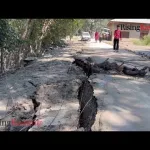INTERNATIONAL WATER DAY
‘Thousands have lived without love, not one without water.’ The worth of this sacred resource is exactly contained in these words of the famous English Poet Wystan Hugh Auden. Water is an essential condition, a thing that is absolutely necessary for life. It is a natural resource whose value is more than its price. Water has enormous and complex value for our households, food, culture, health, education, economics and the integrity of our natural environment. Overlooking any of these values means running the risk of mismanaging this finite, irreplaceable resource. Our planet Earth is also known as a blue planet because of the presence of vast reservoir of water in the form of oceans, lakes, seas, wells, rivers, dams, canals and streams. Despite the presence of so many water bodies and reservoirs, only 1-2 % water is suitable for human use and still about 2.2 billion peoples in the world suffer from access to safe drinking water.
Water scarcity has today assumed alarming dimensions all over the world. Many factors are contributing for this water scarcity which includes the climate change, rising population, the water wastage, its non judicious use, socio-economic development and many others. Rising incomes and urbanization are leading to increased water demand from industry, energy and services and the dietary changes also imply more demand for water-intensive foods (e.g. meat and dairy products). All these factors have lead to a rising demand for this precious natural resource. The anticipated impacts of climate change, such as uncertain rainfall and water availability, further exacerbate these factors. A report of the FAO says that as a consequence to all these factors, the annual amount of available freshwater resources per person has declined by more than 20 percent in the past two decades. This is a particularly serious issue in Northern Africa and Western Asia, where per capita freshwater has declined by more than 30 percent and where the average annual volume of water per person barely reaches 1000 m3 which is conventionally considered the threshold for severe water scarcity.
Considering the essence and the threats looming large over this precious natural resource, the United Nations decided to celebrate March 22 every year as ‘International Water Day’. The idea for this international day goes back to 1992, the year in which the United Nations Conference on Environment and Development in Rio de Janeiro took place. That same year, the United Nations General Assembly adopted a resolution by which 22 March of each year was declared World Day for Water, to be observed starting in 1993 and since then the day has been celebrated all across the globe.
The series of UN World Water Development Report (WWDR) published by UNESCO on behalf of UN-Water and production coordinated by UNESCO World Water Assessment Programme provides policy and decision makers with factual evidence and tools to stimulate ideas and actions. This comprehensive report, funded by the Italian Government, also provides an authoritative overview of global water trends, challenges and solutions. The 2024 Report, entitled ‘Water for Prosperity and Peace’, underlines the interlinked complex relationships between water, prosperity and peace, describing how progress in one dimension can have positive repercussions on the others.
The 2024 report also describes how developing and maintaining a secure and equitable water future underpins prosperity and peace for all and how poverty and inequality, social tensions, and conflict can amplify water insecurity. This year’s theme for the IWD is also based on the report of UNWWDR. The IWD 2024 is being celebrated with the theme ‘Water for Peace’. Water has the ability to create peace or spark conflict. When water is scarce or polluted, or when people have unequal, or no access, tensions can rise between communities and countries. More than 3 billion people worldwide depend on water that crosses national borders. The theme also aims to highlight the benefits of water management as a conduit for peace, showcasing effective mechanisms and tools to enhance cooperation and prevent water-related disputes. The ‘International Water Day’ celebrates water as a means to raise awareness of the global water crisis and a core focus of the observance is to support the achievement of Sustainable Development Goal (SDG) 6: water and sanitation for all by 2030.
In the country, with increase in population and a change in lifestyles the demand for water has increased enormously both in rural as well as urban areas. India with 18% of world population, has just 4% of world’s fresh water, out of which 80% is used in agriculture. In the country, water availability per capita has declined from 5000 cubic meters (m3) per annum in 1950 to around 2000 m3 now and is projected to decline to 1500 m3 by 2025 leading to far less water availability for agriculture. The 2011 census put India into a league of water deficient nations. A country is considered to be water deficient if the per capita availability falls below 1700 cubic meters per person. The per capita water availability fell by 15% during the first decade of this century to 1545 cubic meters per person and is expected to go down further in the immediate future. Although the rate of depletion of this precious resource has gone down in the country but still it is not at par with the rate at which it is being replenished in the nature. Unless and until efforts are being made to conserve water, we are not going to do good for our coming generations.
India accounts for almost one-fourth of the total groundwater extracted globally, more than that of China and the US combined. Paddy is the most important and highest water-guzzling crops that India is producing. Rice is the least water-efficient grain and wheat has been the main driver in increasing irrigation stress. Replacing rice and wheat with other crops like maize, millets, sorghum mapped to suitable geographies could reduce irrigation water demand by one-third. Noting that one kg of wheat required an average 1,654 litres of water and 1 kg of rice requires an average 2,800 litres of water. So, just for rice, a family of four consumes approximately 84,600 litres of virtual water in a month. In 2014-15, India exported 37.2 lakh tonnes of basmati. To export this rice, the country used around 10 trillion litres of water, meaning India virtually exported 10 trillion liters of water.
As agriculture is the largest withdrawal of water, water use in agriculture has to be made more efficient and sustainable. The basic principle should be ‘more crop, per drop’. Many water conservation practices like drip, sprinkler can be adopted more so in rainfed regions of the country where water availability is an issue. Rainwater can be harvested in farm ponds and roof tops for further use in times when water scarcity occurs. The drip and sprinkler system of irrigation avoid the conveyance losses and make the water available directly in the root zone of the plants. Flooding of fields should be avoided. Paddy requirements for water according to FAO estimates make it as one of the most water intensive crops. Techniques like System of Rice Intensification that avoid flooding rice fields should be promoted for cultivation of rice. We should also have to go for healthy diets that include sustainability considerations at the food systems level that reduce the associated water consumption.
Water is a precious resource and needs to be conserved. Ultimately the solution for overcoming the water scarcity has to come from each of us. The ‘Water for Prosperity and Peace’, report already underlines the interlinked complex relationships between water, prosperity and peace, describing how progress in one dimension can have positive repercussions on the others. A more secure and equitable water along with its judicious use is the key to do away with poverty and inequalities, social tensions and conflicts ultimately paving the way of peace and prosperity for all.
(The author writes on agriculture and social issues, and can be reached at: [email protected])





